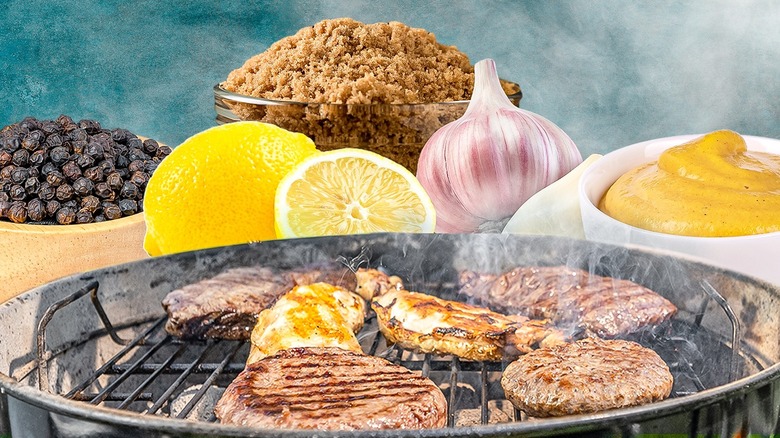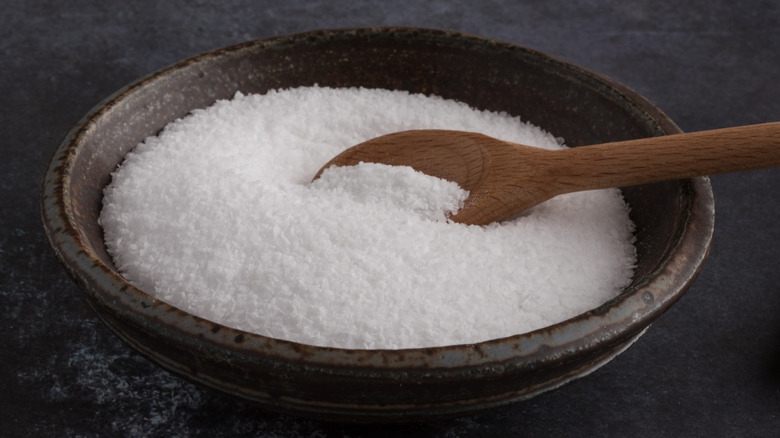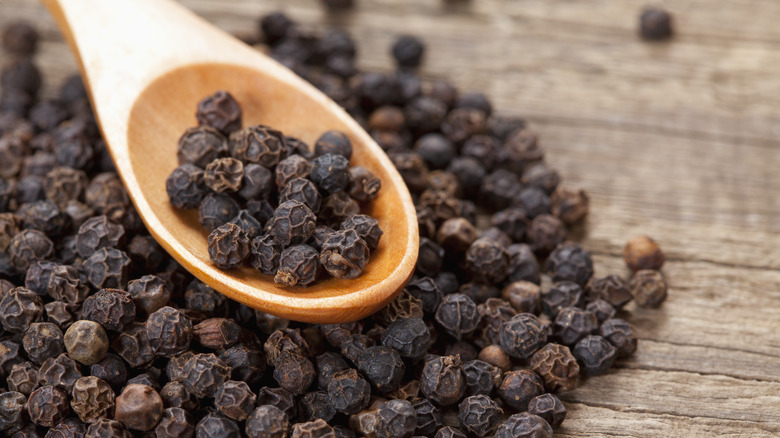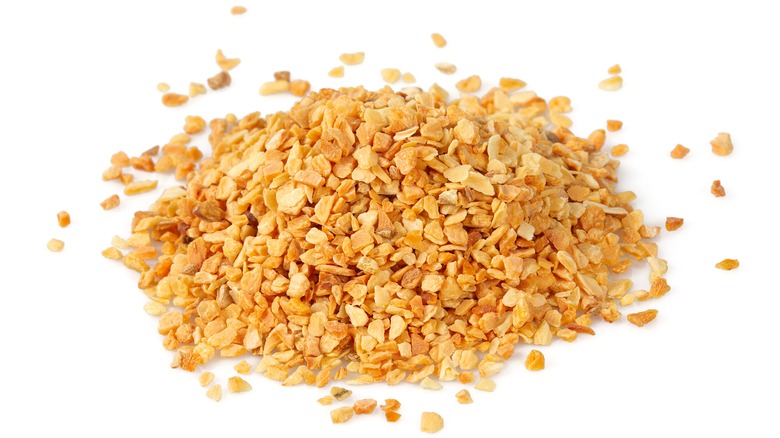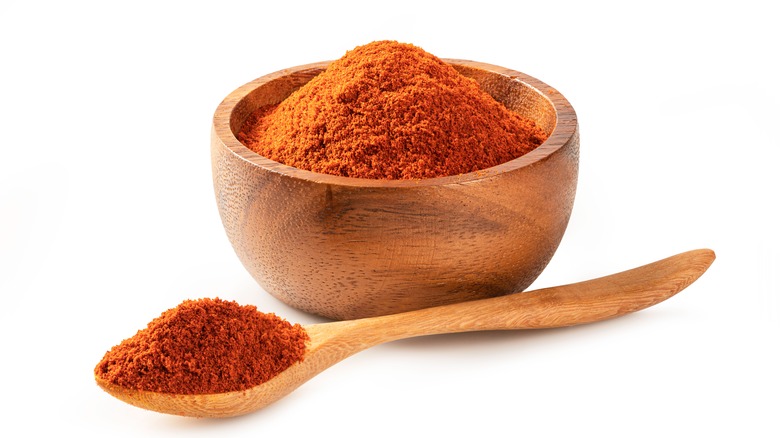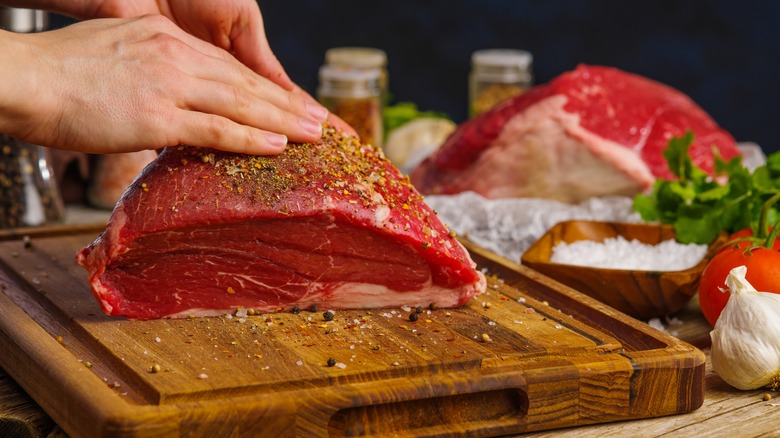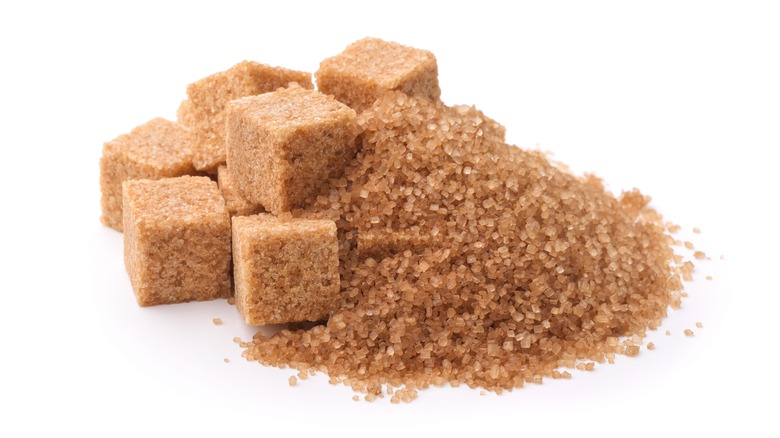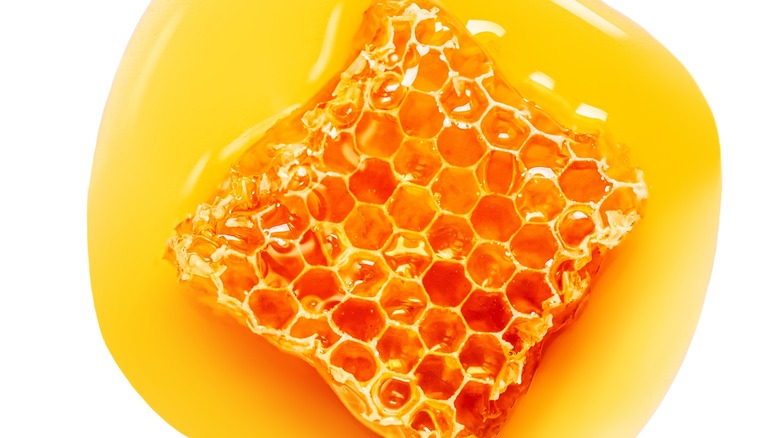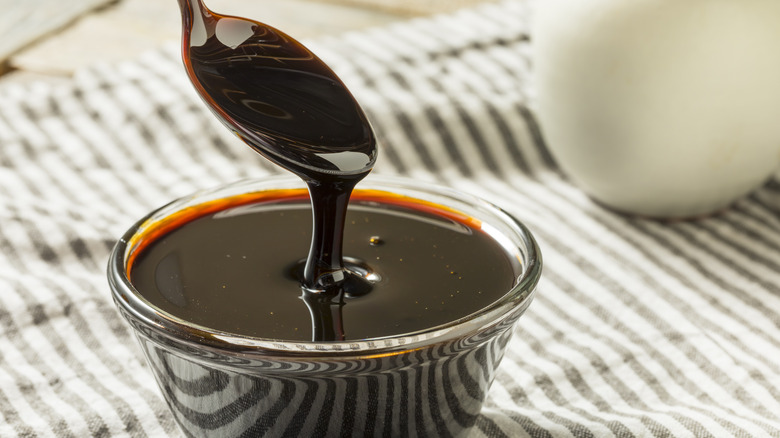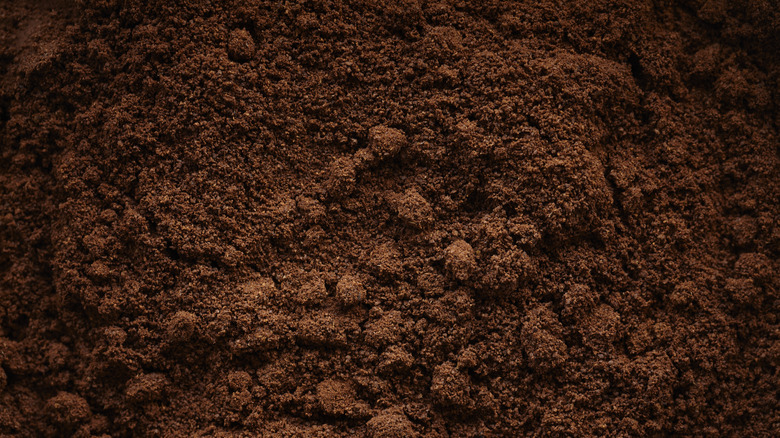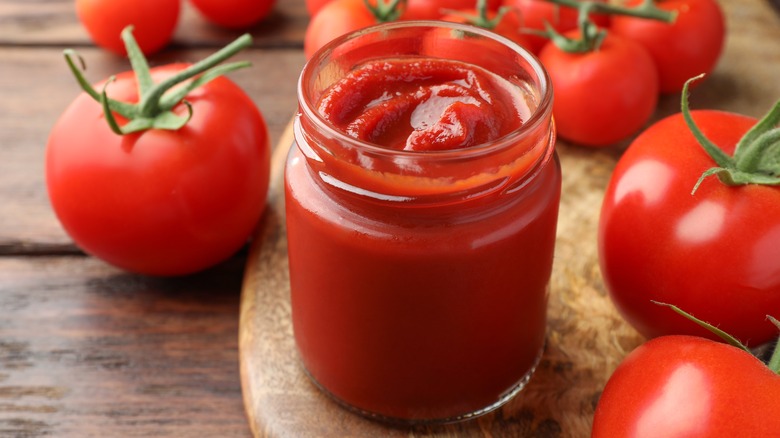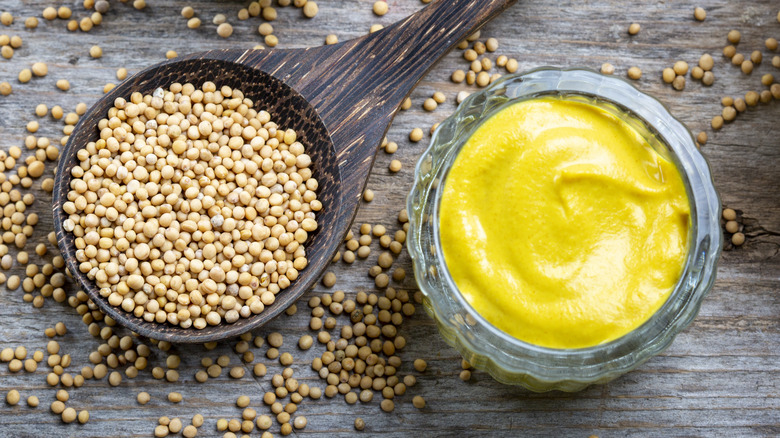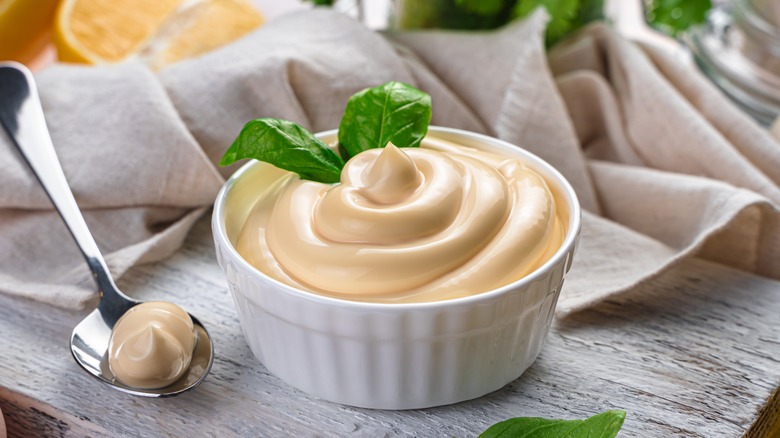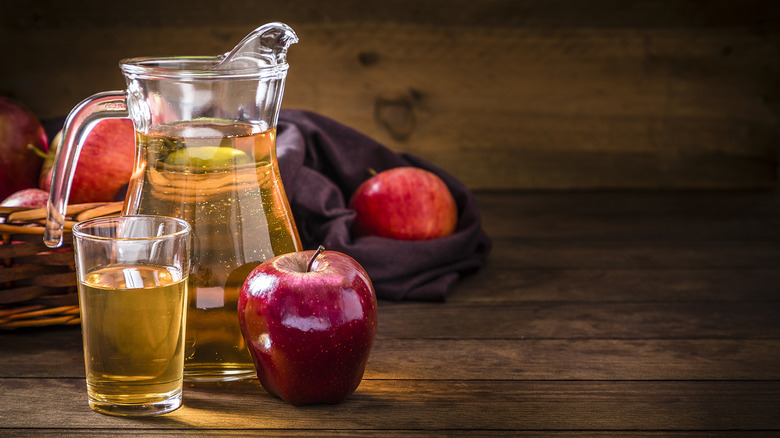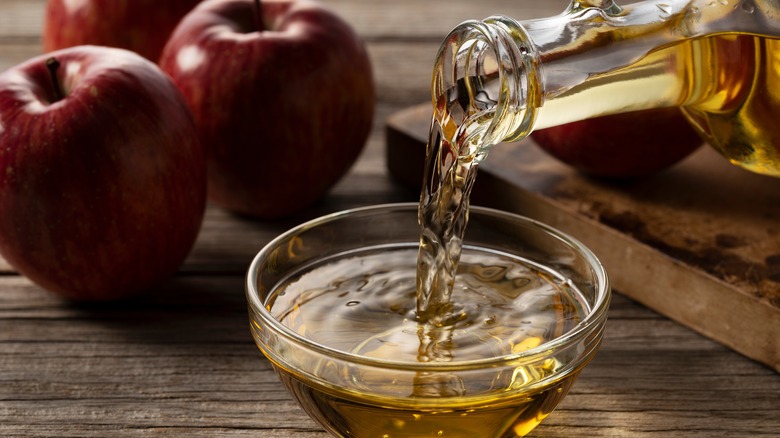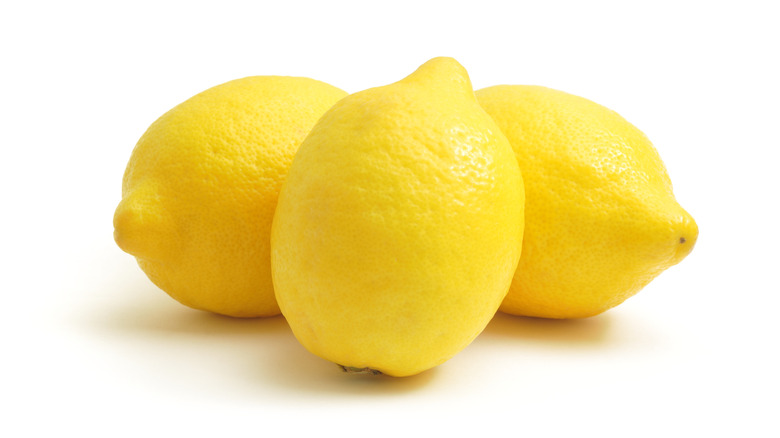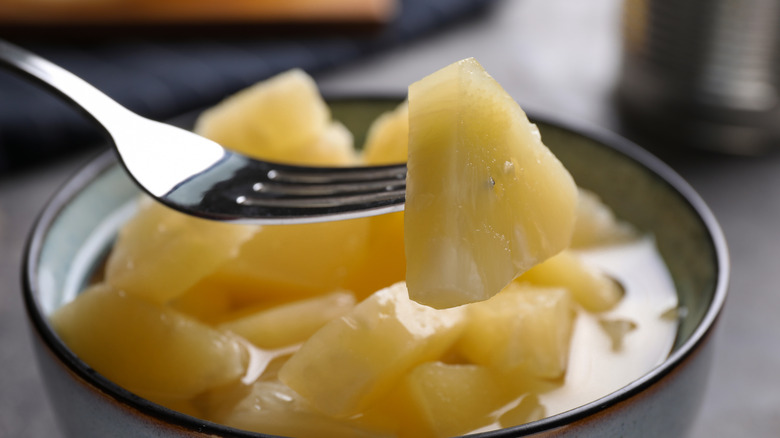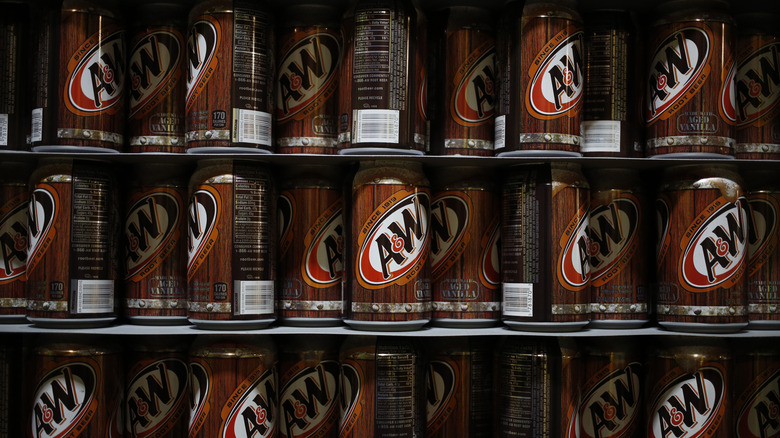20 Essential Ingredients You Should Always Have For Grilling
No aroma whets the appetite more than barbecue. The smell of steak is like a secret succulent assassin that targets your stomach. As American as apple pie and the Super Bowl, barbecuing is the act of slowly cooking meats or vegetables over an indirect flame. Although it originated in the Caribbean, it's now a worldwide phenomenon. In the U.S. alone, there are 16 distinct styles of barbecue. The sweet molasses flavor of Kansas, the ketchup-y taste of Memphis, and the creamy mayo-based BBQ of Alabama are just a few of the many styles that you can practice with your grill.
Grilling is an art form akin to any other culinary skill, and it can take time to get right. This list of essential ingredients has been developed over 10 years of personal experience, along with significant research and study in grilling trends and techniques. A masterfully grilled burger doesn't happen with just a click of your heels and a wave of a spatula. From the perfect temperature and seasoning rub to the ideal juiciness and char, the details are important. Fortunately, we've got you covered. Whether prepping for a summer get-together or an evening of fireworks, here are some essential ingredients you should always have for grilling.
Salt
Probably the most important grilling ingredient you need for any type of meat is salt, which provides much more than just flavor. Salt reduces bacteria growth, extends shelf-life, and increases water retention, which results in more juiciness. When salt is introduced to meat, it enhances the natural flavors. It's great at balancing out the profile by reducing bitterness while boosting sweetness. Depending on the variety, salt can also be used to add visual flare to meats. We recommend using kosher, kosher fine, or sea salt when barbecuing.
Celebrity chef Wolfgang Puck recommends seasoning your meat at least one hour before you put it on the grill. Salt helps bind water, fat, and proteins together in the meat, improving its texture. Natural juices are extracted and reabsorbed during the cooking process. It ultimately tenderizes the meat and makes it more mouthwatering.
Black pepper
Freshly cracked with a piquant zing, black pepper is another essential ingredient that you need for barbecuing. It pairs incredibly well with grilled steak and seals juices into the meat by creating a crusted outer layer. Studies have shown that black pepper is equipped with carcinogen-fighting powers too. Harmful cancer-causing substances can form as meat undergoes the Maillard Reaction, the process that creates the charbroiled crunch we all love so much.
There's a trick to preparing pepper-grilled steak. Like with any spice, the amount and distribution is key. To get the ideal black pepper crust, you'll need a combination of small, medium, and large cracked peppercorn pieces. Randomizing the pieces will give the crust an interesting texture and make the steak more delicious. Rather than using a traditional grinder to crush them, we recommend a small pan. Whether using black pepper for a spicy crust or as a seasoning, it's definitely an essential ingredient.
Garlic
Spicy, savory, and aromatic, garlic is not only an essential ingredient for grilling, it's a must-have for nearly all cooking endeavors. One could even argue that it's almost as important as salt. Infusing meats and veggies with a burst of flavor, garlic is a versatile ingredient that can be cooked whole or chopped and in powder form or granulated. Potency can vary between each variety, which impacts how you use them.
Take garlic powder and granulated garlic, for example; the former is great for low-moisture recipes, while the latter is best for liquid-heavy ones. When grilling, granulated garlic is best because it can withstand cooking for longer periods. It also mixes with other ingredients without being overwhelmed. We highly suggest incorporating it into homemade seasoning rubs.
Staple seasonings & spices
There's no way around it; there are several staple seasonings and spices that you need when grilling. Before you even think about firing up that grill, make sure you have onion powder, cumin, paprika, chili powder, cayenne pepper, and chipotle pepper. Each of these ingredients is excellent alone, but are also commonly used in seasoning rubs and barbecue sauces where their unique qualities are joined in mouthwatering matrimony.
Whether meats or vegetables, onion powder works its magic by providing flavor and sweetness. Cumin brings Middle Eastern flare and, when combined with cinnamon, can transform grilled corn. Depending on the type, peppery paprika can substitute chili powder or bring its own aromatic charm. If you're looking for a spicy zing, look no further than cayenne and chipotle pepper. Those who love smokiness will no doubt enjoy cooking with chipotle spice.
Store-bought steak rub
Although you may be a seasoned seasoner, it never hurts to use store-bought steak rubs. Barbecuing is a slow process that requires patience. A quality pre-blended steak rub can give you the rich flavor you love and save you some time. Patience may be a virtue, but taking a bite of delicious steak is an extreme pleasure, especially if you use this essential grilling ingredient. Steak rubs are available in dry and wet forms. Dry rubs work best on juicy proteins, while wet rubs are better for long cooking times.
Either way, you'll have to get your hands messy for the best results. The deeper the massage, the more flavor will evenly distribute. Along with deliciousness, barbecuing gives proteins a savory tree bark-like crust. For every pound of meat, use around one tablespoon of rub. Apply the rub at least a few hours before grilling or up to 24 hours beforehand.
Brown sugar
Sweet ingredients can play an important role in the barbecuing process. One saccharine ingredient that's definitely worth a sprinkle is brown sugar. From sauces and seasoning rubs to savory brines, it can be used to add flavor in many delicious ways. It's actually a common addition to barbecue sauce, although there are styles that don't include it. When used in seasoning rubs, brown sugar not only sweetens meats but exposure to heat transforms meat into a caramelized layer of crust.
For white meat proteins that have a tendency to dry while cooking, try brown sugar brines. Brining involves soaking proteins in salt and water and sometimes herbs. It infuses meats with flavor while helping them retain juices. Brown sugar brines are great for making perfectly flavored pork chops and for impressing your friends at dinner parties.
Honey
Savory and sweet collide in the epic tale of an essential grilling ingredient. Add honey to that list immediately. This syrupy food can be used for flavor, to bind and add texture to meats, and in crave-worthy barbecue sauces. In fact, when cooking with honey, simply blend it together with ketchup, garlic powder, onion powder, salt, pepper, and citrus juice to make a tasty marinade.
Honey can also reduce acidity in marinades, which will give your meats a more balanced flavor profile. When it's rubbed on meats, it helps seal in the tasty juices while cooking. But there is a caveat to grilling with honey: It can easily burn. Before applying it, you must first mix it with a juice, oil, or liquid mixture like the brine mentioned above.
Molasses
Honey's syrupy sibling, molasses, is an explosion of sugary bliss. In the wide-reaching world of barbecue, you'll find that molasses is a popular ingredient used in sauces. A sweetly unique sauce, Kansas City-style barbecue sauce is one of America's most popular varieties. It's a tomato-based sauce that includes molasses and brown sugar, onion and garlic, and spices too. It pairs fingerlickingly-good with a whole chicken, pork ribs, beef brisket, and fish.
Memphis is another city known for using molasses in its regional barbecue style. According to Memphis Travel, there are over 100 barbecue joints spread throughout the state. There, pork is the protein of choice, and we're pulled pork, a rack of ribs, and more. Although BBQ restaurants still serve chicken and beef, Memphis locals tend to prefer the whole hog.
Ground coffee
Steak was made to be seasoned with rich flavors. From aromatic chili powder to savory liquid smoke, with the right ingredients, steak is a treasure chest of flavorful depth. One unlikely ingredient you should add to your steak rub is coffee grounds. Yup, you heard right; coffee grounds can unlock a full-bodied beefy taste that's toasted, nutty, and sweet. When blended into seasoning rub, it secures the juicy goods by forming a crusty outer layer.
Within the dark brown hue, coffee grounds contain compounds similar to red wine. They permeate through steak and make it tastier. To add this ingredient to your steak rub, always use freshly ground coffee as a grilling ingredient as the flavor is more potent. Pre-ground coffee works as well, and even instant does in a pinch. But, of course, neither hold a coffee pot to the fresh kind.
Ketchup
Ketchup is not only an essential ingredient for grilling; it's one of the main ingredients in barbecue sauce. In fact, the two sauces are quite similar, except that barbecue sauce also includes brown sugar, vinegar, hot sauce, and seasoning. There are several styles of popular ketchup-based barbecue. From the sweet and spicy styles of West North Virginia and Oklahoma to the tantalizing and tangy flavors of Kansas City and St. Louis-style barbecue, our beloved American pastime simply wouldn't exist without ketchup.
We recommend keeping a bottle of ketchup handy for homemade barbecue sauce. It gives the sauce a rich, full-bodied flavor and thicker consistency. Making sauce from scratch is actually easier and faster than it may seem. You can whip together a homemade batch of barbecue sauce in under 10 minutes. Ketchup is also great in marinades and as a tangy glaze for meat.
Mustard
Along with savory satisfaction, great-tasting barbecue sauce also carries a touch of tang. Many styles of sauce incorporate vinegar to balance out the sweet and salty notes — vinegar is also an ingredient used in ketchup. That said, there are other varieties that subvert the popular idea of what barbecue sauce is and forego ketchup and vinegar altogether. South Carolina's gold sauce is one example. Made from a mustard base, it's a vibrant, yellow dive into regional heritage.
If you're thinking about swapping mustard for barbecue sauce, we suggest blending it with Dijon or whole-grain mustard. Unlike regular yellow mustard, Dijon has an extra pungent kick, while whole-grain mustard will give the sauce some texture. Try starting with just 2 tablespoons and taste-test from there.
Mayonnaise
There's no denying the dominance of tomato-based barbecues, but if you haven't tried mustard-based or mayo-based sauce, then it's time to pack up and explore the lesser-known parts of grill life. One state that has a truly unique take on sauce is Alabama. There, hometown pride comes in the form of a simple saucy mixture of vinegar, salt, coarsely ground black pepper, and, surprisingly ... mayonnaise.
Alabama BBQ sauce has a distinct creamy and tangy taste that's savory, spicy, and sour. It's traditionally cooked over locally sourced hickory wood chips, which gives it a deep flavor. Along with barbecue sauce, mayonnaise may actually be a better rub than butter if you're looking for a crispy golden-brown crust. It has to do with its fat content, which helps boost the flavor of fat-soluble ingredients commonly found in aromatics, and unlike butter, doesn't add flavor. The consistency of mayo is thick enough to spread on meats evenly without worrying that it will drip off. When mayo is exposed to heat, the water content evaporates and leaves a thin crusty layer of tasty Maillard browned fat.
Store-bought BBQ sauce
Barbecuing is a low and slow style of cooking that requires lots of time and patience. Even the most experienced grill masters need adequate time to cook the best cue, preferably a full day. In a perfect world, we'd all be given time off to dedicate to making everything from scratch. Thankfully, with store-bought barbecue sauce, you can save yourself and your guests from growling stomachs.
From traditional tomato-based options to niche varieties, no matter your preference, simply stop by your local grocery store. Trust us, you won't lose any cool points opting for store-bought over scratch. There are many types of barbecue sauce to choose from, and trying different brands is also a great way to inspire new homemade recipes.
Apple juice
One unlikely ingredient that's super essential to ensuring an ideal barbecuing experience is apple juice. It serves two important purposes during the 'cueing process, to make meat juicier and add additional moisture. If you enjoy succulent fall-off-the-bone barbecue like the rest of us, you'll definitely incorporate apple juice into your culinary arsenal. During the cooking process, it can be used in marinades and can also be incorporated into the 3, 2, 1 barbecue method, which involves wrapping meats in seasoning and liquids for two hours. The results are succulent and super tender apple amazingness.
Spritzing is another useful way to barbecue with apple juice. Meat loses moisture during the cooking process and spritzing helps by contributing juiciness and flavor. It also helps seasoning rubs stick and better infuse into meats. All you gotta do is pour it into a bottle and spray, spray away.
Apple cider vinegar
If you've never made homemade barbecue sauce, hopefully, this list inspires you to give it a try. A quality sauce made from scratch is far superior to store-bought. Aside from different bases and sweeteners, you get to experiment with different kinds of vinegar as well. Vinegar is the tangy taste in BBQ sauce. Most homemade recipes and store-bought brands use distilled white and white wine vinegar. Both are neutral-flavored and carry an intense acidic kick.
For a flavorful alternative to everyday white vinegar, try adding apple cider vinegar to your barbecue sauce. Tangy and aromatic, apple cider vinegar is made from fermented apples. Unlike distilled and white wine vinegar, it has a noticeable apple taste, and the acidity is less intense. ACV can also be used on grilled meats, seafood, and veggies as a delicious marinade. Not only does it tenderize meat, but when blended with seasoning, it also provides incredible flavor.
Lemons
The simple squeeze of lemon juice or a sprinkle of lemon zest atop a perfectly seared steak is pure meaty bliss. Lemons aren't just amazing in the kitchen; they're incredible flavor boosters for outdoor grilling as well. Not only can their juice be used, but lemon zest is also an awesome citrus provider. When cooking with lemons, you can add them to sauces and marinades and use them to tenderize meats. Lemon zest, on the other hand, adds flavor without introducing additional moisture or acidity. Too much moisture may interfere with the grilling process, while acid can dampen the color of green vegetables.
Along with offering a burst of refreshing citrus, lemons can also be used to clean your grill. Their acidity makes them naturally antiseptic and antibacterial. Start cleaning by first slicing a lemon in half widthwise and then salting it liberally — salt will give the lemon some friction against the grill. De-greasing is easy, too, simply put the lemon directly on the grill cut-side down and use a grilling fork or tongs to move it up and down. Of course, if your grill is riddled with charred bits, you should use an actual grill cleaner.
Fruit juice
There are so many tasty ways to add a touch of sweetness to barbecue sauce. Brown sugar and molasses offer a depth of flavor that compliments the savory notes in sauces, but fruit juices offer an entirely new sweet experience. Popular in Hawaiian-style barbecue, pineapple juice is a classic way to add a sweet and tangy burst to your sauce. In fact, it's a great way to use leftover juice from canned pineapples. Rather than dispose of it, add it to a store-bought sauce or marinade.
There are many fruit flavors to experiment with. Peach juice, for example, pairs nicely with smoky sauces. Try adding tart cherry or cranberry juice for full-bodied sauces that can cover the mild, base taste of chicken or pork. Beyond sauces, fruit juices work deliciously as marinades for meats too. Similar to vinegar, juices like kiwi, pineapple, orange, cranberry, and even papaya can actually tenderize meats while infusing them with floral or botanical notes. There's literally a whole world of fruit-infused grilling that's waiting to be explored.
Root beer
This next essential ingredient you need for grilling may surprise you. An infusion of the iconic birch, mallowy taste from root beer will change your barbecue sauce forever. When adding it, we recommend using two cups of root beer for every can of tomato sauce. You can follow the usual recipe and simmer all of the ingredients together on medium heat for 20 to 30 minutes or until it becomes the desired consistency.
Another awesome thing about using this soda hack is that you can experiment with different root beer brands to see which flavor you prefer. There are classics like IBC and Dad's or newer brands on the block like Olipop and Maine Root. Along with tasty barbecue sauce, root beer can be added to marinades as well.
Plain yogurt
Quality meat deserves quality marinade. One essential ingredient that you may not consider marinating your meat with is yogurt. It surprisingly works in the same way as vinegar. It tenderizes the meat and allows it to better absorb the marinade. Unlike vinegar or citrus fruits, yogurt is made from fermented milk, which is mildly acidic and composed of bacteria cultures. When meats are exposed to those cultures over long periods, it breaks them down.
Heavily acidic marinades can potentially harden meat rather than tenderize it. Vinegar's pH level is 2.5, meaning very acidic. By comparison, yogurt's pH level ranges from 4.4 to 4.8, per Healthline. A yogurt marinade can be used on chicken, beef, and pork. It's creamy and neutral-flavored too, which means that you can combine it with your favorite seasoning and spices.
High smoke point oil or fat
With the many essential grilling ingredients that are necessary, using the right oil is possibly the most important. Oil distributes flavors, helps foods cook evenly, and prevents them from sticking. Barbecue grills are notorious for developing crusty masses of charr, which usually happens when food is cooked in high heat yet isn't oiled properly. Food should be oiled rather than the grill itself. Oiling food does both jobs for you; it greases food and the grill as it cooks.
Oil is an essential ingredient because it adds to the taste, whether it's neutral or flavored, and the type of oil you use is important too. High-smoke-point oils like sunflower, peanut, coconut, safflower, or avocado are best for grilling. You can also use ghee for really fiery temperatures. Another reason to oil food rather than the grates is because oil can present a potential fire risk. If overused, drippage can result in the type of flame broil you don't want.
